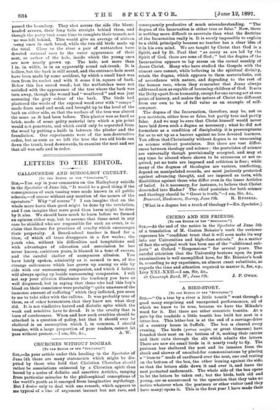LETTERS TO THE EDITOR.
CALLOUSNESS AND SCHOOLBOY CRUELTY.
[To THE EDITOR OF THE " SPECTATOR."]
Sin,—You say in your comments on the Haileybury suicide in the Spectator of June 5th, "It would be a good thing if the consequences of such teasing were made known in all public schools,—of course without any mention of the names of the operators." Why "of course " ? I can imagine that on the whole more harm than good might be done by the revelation, and I can imagine that more good than harm might be done by it also. We should have much to learn before we formed an opinion either way, but to assume that those must in any case be shielded who are responsible for such an event, is to claim that license for practices of cruelty which encourages their perpetuity. A Board-school teacher is fined for a blow, of which all trace disappears in a few weeks ; the youth who, without his difficulties and temptations and with advantages of education and association he has never known, embitters years, is blamed in a tone of excuse, and the careful shelter of anonymous allusion. You have lately spoken, admirably as it seemed to me, of the strange callousness which has grown up among us side by side with our unreasoning compassion, and which I believe will always spring up beside unreasoning compassion. I will not say your allusion illustrates the tendency you have so well diagnosed, but in saying that those who had this boy's blood on their conscience were probably " quite unaware of the immense amount of suffering" which they inflicted, you seem to me to take sides with the callous. It was probably true of them, as of other tormentors, that they knew not what they did. It is not vindictive hatred and diabolic spite which the weak and sensitive have to dread. It is the cruelty that is born of carelessness. When and how such cruelties should be attacked is a question of policy, but that it should ever be sheltered is an assumption which I, in common, I should imagine, with a large proportion of your readers, cannot let
pass without protest.—I am, Sir, &c., A. W.


































 Previous page
Previous page